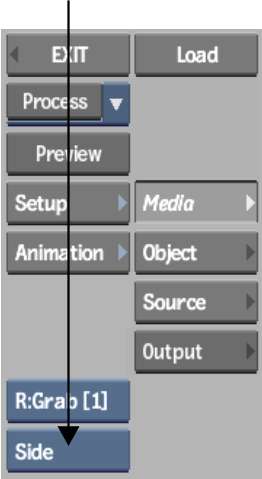The volume of space viewed
by the camera eye is called the frustum. The frustum is in effect
a viewing pyramid. The camera eye is located at the apex of the
pyramid, and the far clipping plane forms the base. The pyramid
may be truncated by the near clipping plane.
If you place a surface
within the frustum, it is visible in the final animation. If the
surface is located outside the scope of the frustum, it is not visible
at that frame in the animation.
To see the camera and frustum:
- From the View box, select Side.
- In the image window controls, click
 to zoom out from the scene.
to zoom out from the scene.
- Select Pan in the Edit Mode box and pan
around the scene until you see the camera eye icon. Alternatively,
use Orbit mode to pan around the scene in circular motion.
- Go to the Camera menu and drag the Roll
field until you see the four sides of the frustum.
- To modify the frustum, do one of the
following:
- Change the position of the near clipping
planes to alter the depth of the frustum. See
Moving the Clipping Planes.
- Change the position of either the camera
eye or the camera's point of interest to alter the orientation of
the frustum. See
Moving the Camera Eye and Point of Interest.
- If the Physical Camera
button is disabled, enter a value in the FOV (field of view) field
to adjust the width of the camera frustum.
- If the Physical Cam
button is enabled, enter a value in the Focal Length field to narrow
or widen the frustum. You can also alter the depth of the frustum
using only the near clipping plane.






 to zoom out from the scene.
to zoom out from the scene.